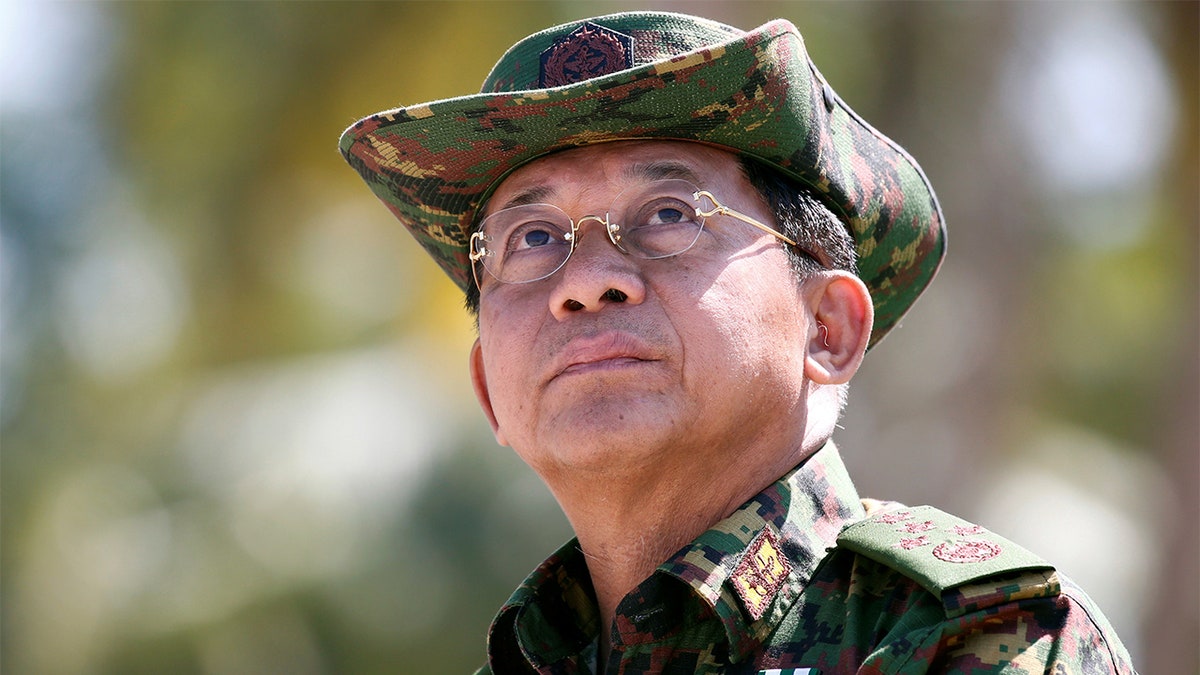Fox News Flash top headlines for Dec. 10
Fox News Flash top headlines for Dec. 10 are here. Check out what's clicking on Foxnews.com
The U.S. on Tuesday imposed sanctions on four Burmese military leaders for long-alleged human rights abuses against Rohingya and other minorities.
At the same time the U.S. took the toughest action yet targeting military chief Min Aung Hlaing for what’s been charged as a genocide against the Rohingya minority, Burma’s civilian leader Aung San Suu Kyi faced the first day of hearings at the United Nations' highest court, the International Court of Justice in The Hague, Netherlands. She will defend her country’s military against the accusations of genocide.
The U.S. Treasury Department, issuing sanctions against 18 individuals around the world on International Human Rights day for their roles in "serious human humans rights abuse," said Hlaing had been responsible for the military at a time when “members of ethnic minority groups were killed or injured by gunshot, often while fleeing, or by soldiers using large-bladed weapons; others were burned to death in their own houses. There are credible claims of mass-scale rape and other forms of sexual violence committed by soldiers.”
The sanctions freeze any U.S. assets held by those targeted and prohibit Americans from doing business with them. It also imposed sanctions on leaders in Pakistan, Libya, Slovakia, Democratic Republic of the Congo (DRC) and South Sudan for their roles in human rights abuse.
Hlaing’s deputy, Soe Win, and two other subordinates were sanctioned for heading army units that led the crackdown on the Rohingya.
A military crackdown in 2017 drove more than 730,000 Rohingya Muslims to flee to neighboring Bangladesh.
The U.S. Commission on International Religious Freedom has long been calling on the State Department to reimpose sanctions -- many of which were rolled back during the Obama administration -- to target military abusers.
The U.S. action, however, falls short of reimposing economic sanctions on Burma that were lifted after the military began loosening its grip on power. It does not target military-owned companies that dominate some sectors of Burma’s economy, according to Reuters.

Myanmar military commander-in-chief, Senior General Min Aung Hlaing. REUTERS/Lynn Bo Bo/Pool - RC1A7FCEA250
Burma, more recently known as Myanmar, denied accusations of widespread abuses and said the military’s actions were a part of the fight against terrorism.
In court Tuesday, Burma was accused of purporting to “destroy the Rohingya as a group, in whole or in part, by the use of mass murder, rape and other forms of sexual violence, as well as the systematic destruction by fire of their villages, often with inhabitants locked inside burning houses,” a senior advocate for Human Rights at Refugees International, Daniel Sullivan, told Fox News.
For more than two years, the Burmese military allegedly gunned down thousands of Rohingya, and burned thousands more at the stake. Others were raped or had their homes burned to the ground.
The International Court of Justice case was brought forth by the Gambia, a Muslim-majority African country.
“All that Gambia asks is that you tell Myanmar to stop these senseless killings, to stop the acts of barbarity that continue to shock our collective conscience,” Gambia’s Attorney General and Justice Minister Abuacarr M. Tambadou told the court on Tuesday. “To stop this genocide of its own people.”
AUNG SAN SUU KYI BEGINS DEFENSE OF BURMA AGAINST ALLEGATIONS OF GENOCIDE
Suu Kyi, Burma’s civilian leader and a Nobel Peace Prize Laureate, was once known as a champion of human rights for facing arrest and oppression at the hands of the same military she has defends. She has since picked up the line of the military that the Rohingya population are illegal immigrants and “terrorists.”
Burma’s U.N. Ambassador Hau Do Suan told Fox News in a 2018 interview that the humanitarian issue arose after a Rohingya group carried out “terrorist attacks” against the Burmese government in 2016 and 2017. He said the "Bengali Muslim population problem" -- referring to the Rohingya -- has been going on since the country gained independence from Britain in 1948.
While the court has no enforcement mechanism should it find Burma guilty of the atrocities, it could ramp up pressure on other countries to take a stronger stance against the tiny southeast Asian country.
John Sifton, Asia advocacy director for Human Rights Watch, hoped the European Union (EU) would follow in the footsteps of the U.S.
“It is unfortunate the decision took so long. The crimes in question were incredibly serious,” he said. “If the EU follows suit with similar measures and works with the U.S. to press other jurisdictions to crack down, soon the Myanmar military will find that their world is geographically and financially shrinking.”
Fox News' Hollie McKay contributed to this report.









































